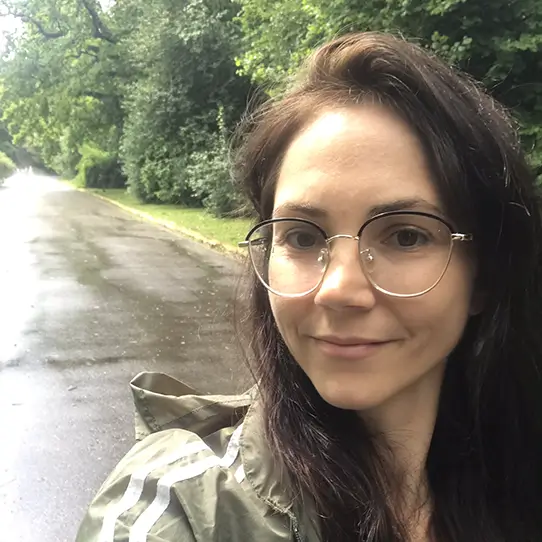— Iuliia, have you been involved in volunteer activities before?
—Yes, but not on a permanent basis. As the war began, I began to look for information on how I could help and what would be close to my heart. Periodically I have donated via telegram chat, where people help refugees from Ukraine who are going to Europe through Russia. They either let you stay at their place or give you a ride to the station. And I took part there a little: I helped with children’s stuff and brought all sorts of treats to the children in the hospital.
We essentially save lives by helping to equip bomb shelters.
— Was that when you were still in Russia?
— Yes, in Moscow. When the war started, I was living in Russia and was on maternity leave.
— Now you are in Kazakhstan. How did your life change?
— I am still on maternity leave, but I work part-time as a courier.
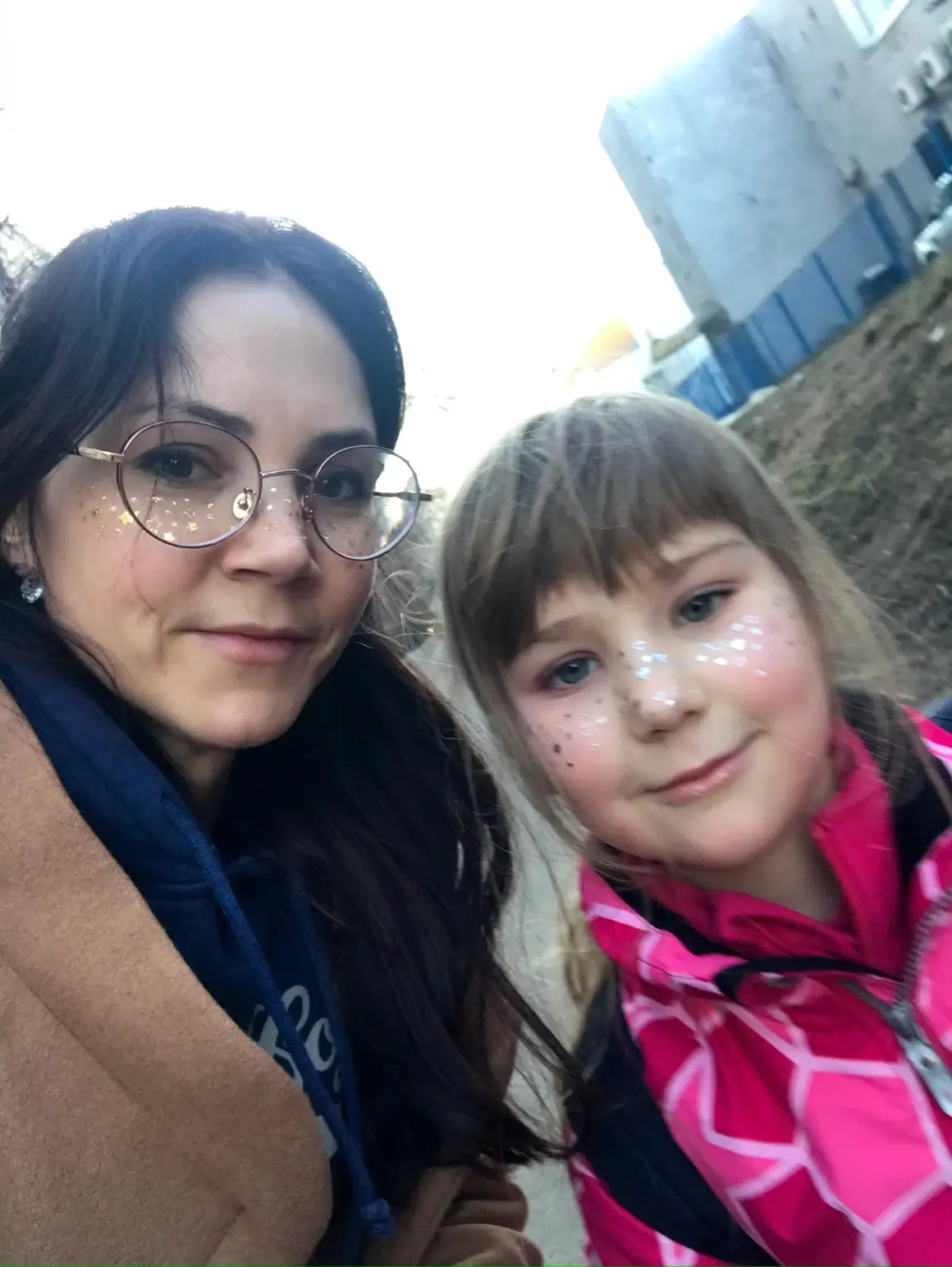
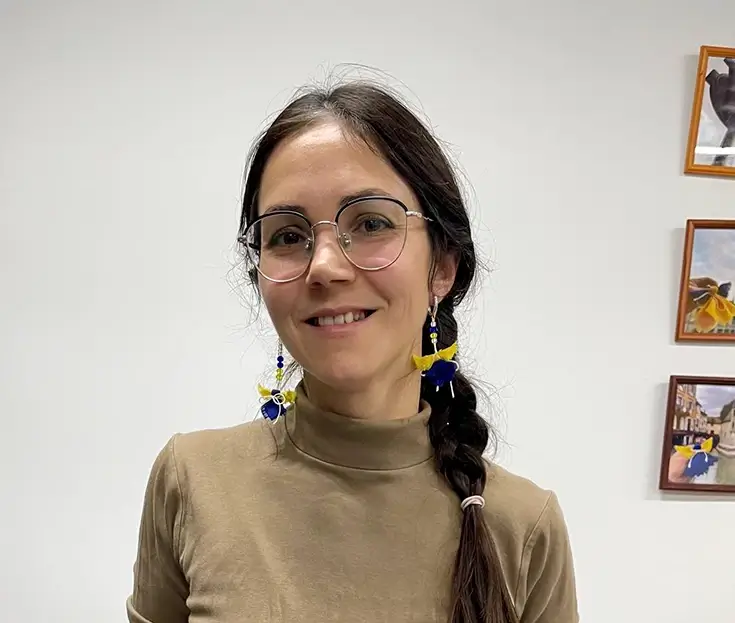
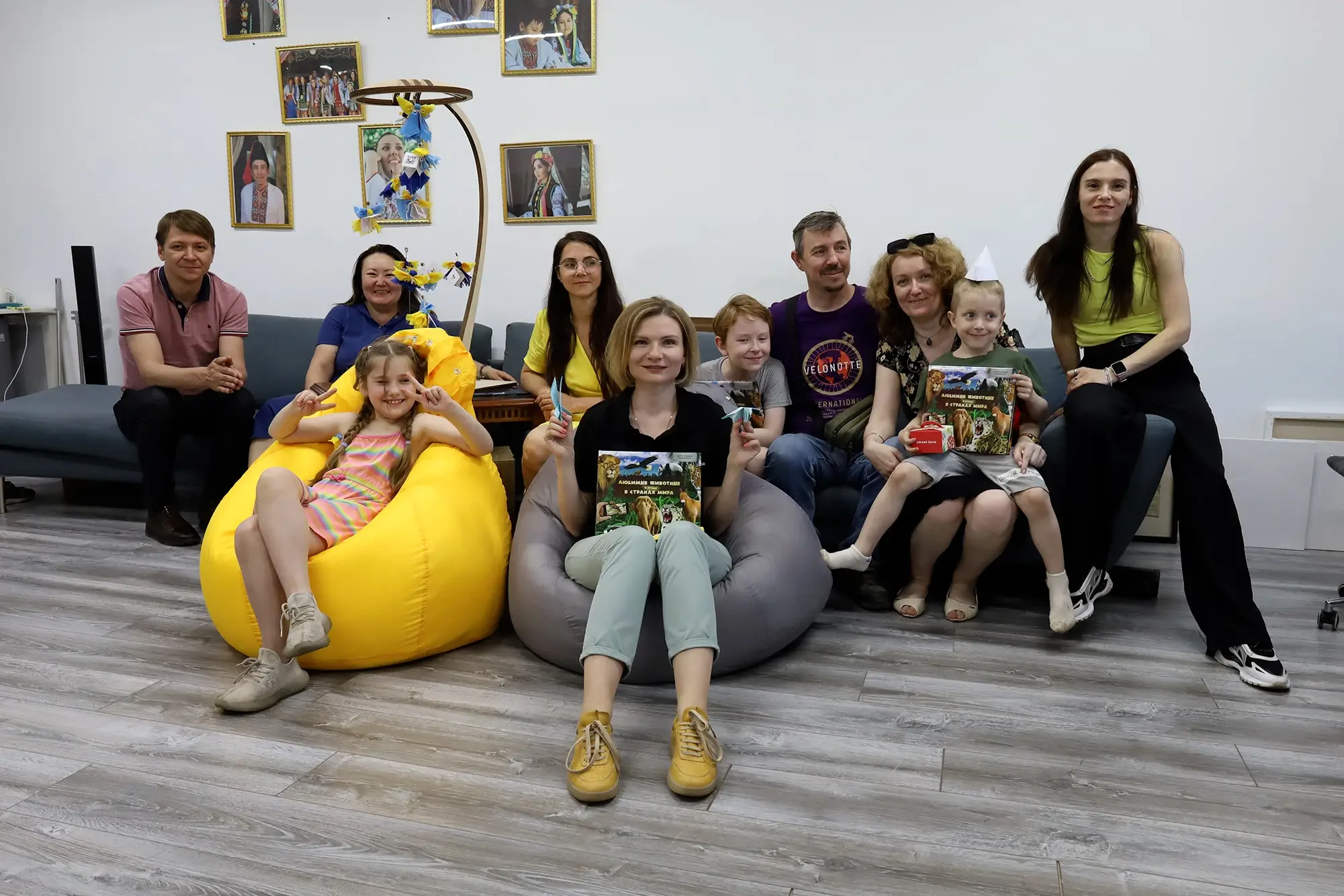
— How did you end up in Kazakhstan? Did you decide to move immediately?
— I actually wanted to move for a while, but I did not know where exactly. I suggested it to my husband, but he rejected all options because he did not see himself as an emigrant. He was born and raised in Moscow, lived there his whole life and never really travelled anywhere. Myself — I am a migrant and a Ukrainian and I lived in Russia half of my life. And when the war started, I naturally wanted to take everything and leave.
But since I am with two children and my husband, it is impossible to do this by simply taking everything and leaving for nowhere. I couldn’t find a way out — where to go, what to do… all this time was very difficult for me.
Constantly just news and news… I told my husband that we needed to leave somewhere. He answered, “Yes, go ahead, look. I’m working, and you look. Wherever you say, we’ll go there.” And when the mobilisation happened, there was nothing to even think about, because my husband received a subpoena. Not specifically to be mobilised, but “to clarify his data.” This was right the day before mobilisation was announced. My heart sensed that of all the people my husband would be the first one taken away if there was mobilisation.
— Why was there such confidence?
— I understand that the military recruiting office does not see this — what he is like, my husband. But, firstly, he served in the army, he has experience. He is engaged in physical labour. And maybe this is illogical, but these were my arguments: that most likely they will come to such people faster than to those who sit in the office. And when the subpoena arrived to clarify the data, the emotions were… very stormy. My husband travelled around Moscow for a couple of days,and saw how [the mobilised] were being caught, called from work and said, “That’s it, we’re leaving.” We packed our things and left for Kazakhstan.
— Did the events of February 24 come as a surprise to you?
— No, but the scale of it was a surprise to me. I was sure that the war would start on February 21, when he [Putin] signed a decree recognizing the independence of the DPR and LPR. And when I heard the phrase “within the administrative-territorial boundaries of the regions,” I called my mother and said, “Mom, did you hear what he said? Mom, this is war.” But no one thought it would be like this. And on the 24th, of course, I was shocked by the scale of the hostilities. My husband leaves early for work, I woke up right after him — I was feeding the baby. I opened the news and… immediately started to cry. I called my mother, they were in Mykolaiv. And they said that they heard explosions and arrivals. Then Kulbakino was bombed. This is an airfield near Mykolaiv.
Tiredness occurs from time to time. But I tell myself that I am not on the territory of Ukraine, and it is much more difficult for people there than for me. What also helps me is the belief that the war will end and Ukraine will definitely win.
— Do you remember the moment when the desire to help Ukraine appeared?
— Straight away… Of course, not in the first hours. Maybe on the third day when I felt a little better. Because I almost haven’t eaten during those days. Before, even during a lot of stress it never happened that I did not eat. During the first weeks I started searching how I can help. I had certain criteria. This should not have been general help, but more targeted. That’s how I wanted it.
— Why did you choose the “Angels of Freedom” project?
— I did not choose it (she laughs). I came across information, possibly in the “Kovcheg”. I immediately followed the “Angels of Freedom”, but I couldn’t get to them. In general, emigration was not easy for me. It took me a long time to come to my senses. My husband started going to work, and I stayed at home looking after the children. And this circumstance also does not allow you to move or do anything. But in February I finally got to the “Angels of Freedom”.
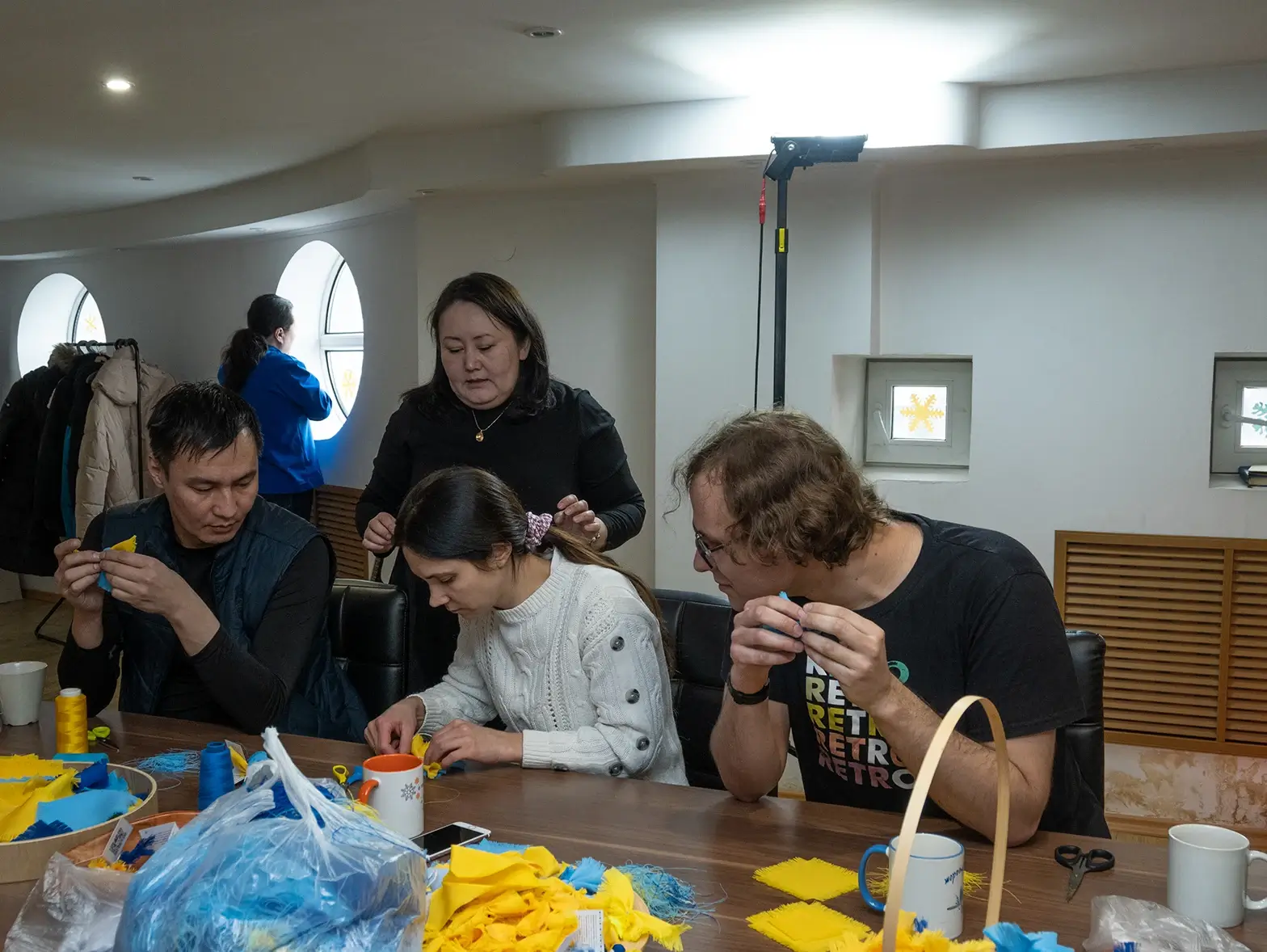
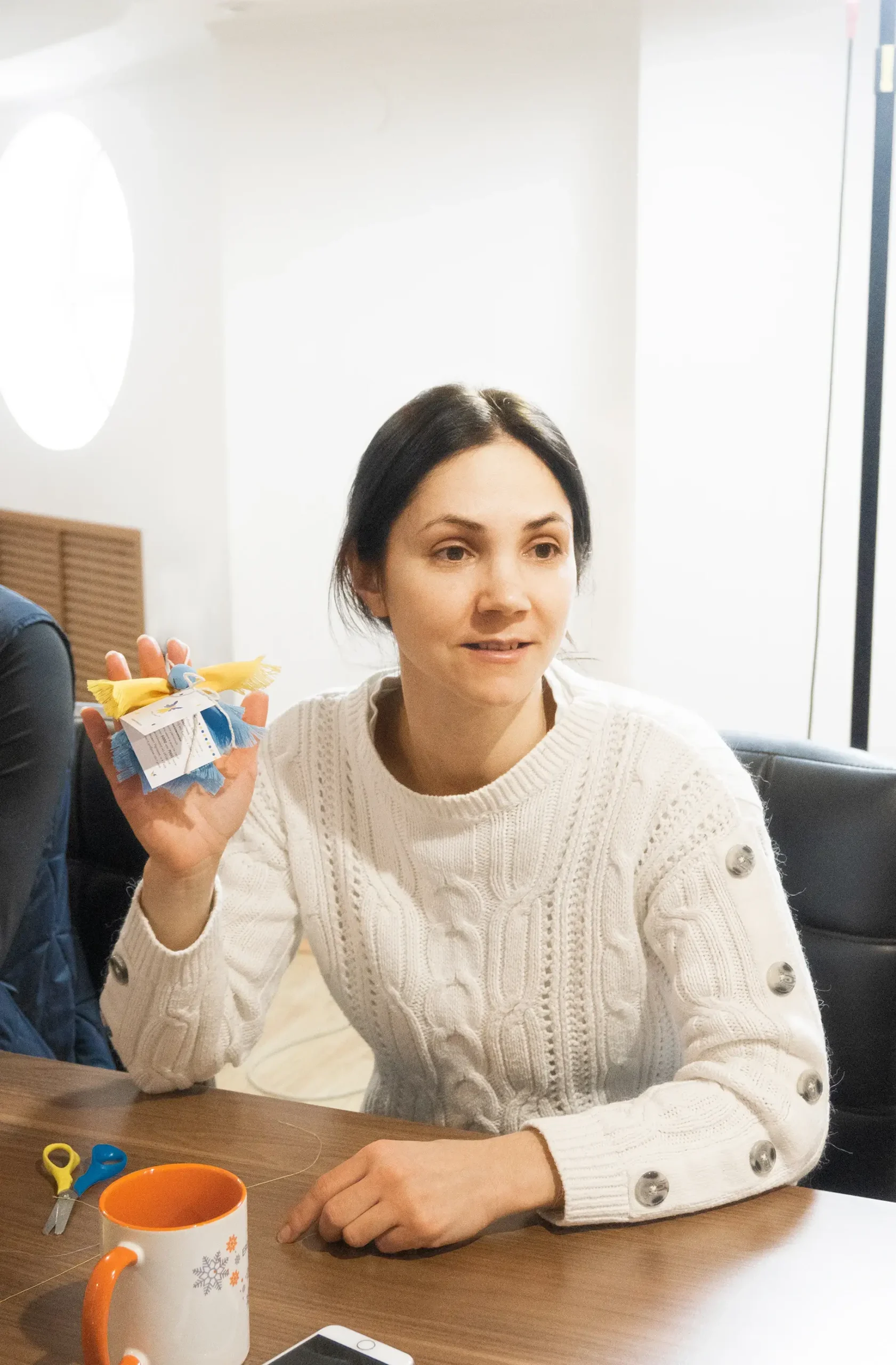
— Do you remember the first time you participated in a fair or toloka? What kind of atmosphere did you face?
— It was a toloka. When I was on my way there I was worried that I would not fit in. I don’t know, people can be different. I did not understand where I was going. I was a little late for the beginning, so when I came everyone was already talking to each other and it was clear that everybody knew each other well. There was such a warm atmosphere. It was this warmth of communication that really struck a chord. We also celebrated the birthday of one of the volunteers, there were cakes (laughs). My daughter regretted not going with me. People were very friendly and helpful. I had the feeling that this was not the first time I had come to them. I was also pleasantly surprised that there were many relocants from Russia.
— What do you think motivates these Russians? Feeling of collective guilt or responsibility?
— Perhaps, feeling of guilt. But I don’t presume to say that this is so. Rather, a desire to help in any way you can.
— After all, there are others who came from Russia and distanced themselves from everything that was happening?
— Yes, I saw those at fairs. I don’t know for sure, no one showed me their passport. But nevertheless, it seems to me that I have seen such people. Sometimes people come up, see something interesting, and when you tell them what the project is they suddenly turn their heads away. It is very funny to watch such a reaction. It seems to me that these are precisely those Russians who fled from mobilisation in the first place, and then turned a blind eye on everything else. And there are those who do not want to be participants in the war, this is a different contingent. These are our volunteers who want to do good. Yes, probably this is a desire to do good in response to the evil that is happening in the world. When you show by your personal example that you do not have to stay on the sidelines somewhere, but help as much as you can, even if you do not have the financial ability. It is not just about finances, you can also help with your time.
— What could you tell to those who say, “I’m an ordinary person and I can’t change anything. This conflict was started by governments, and only they can resolve it”?
— This is a big misconception. And this is exactly what those who started this war want from us — for us to be just ordinary pawns, to submit to what they got us into. Actually this is not true. Each person decides for himself who he should be. To be “participative” or indifferent. Someone chooses to go kill, and someone chooses to do good.
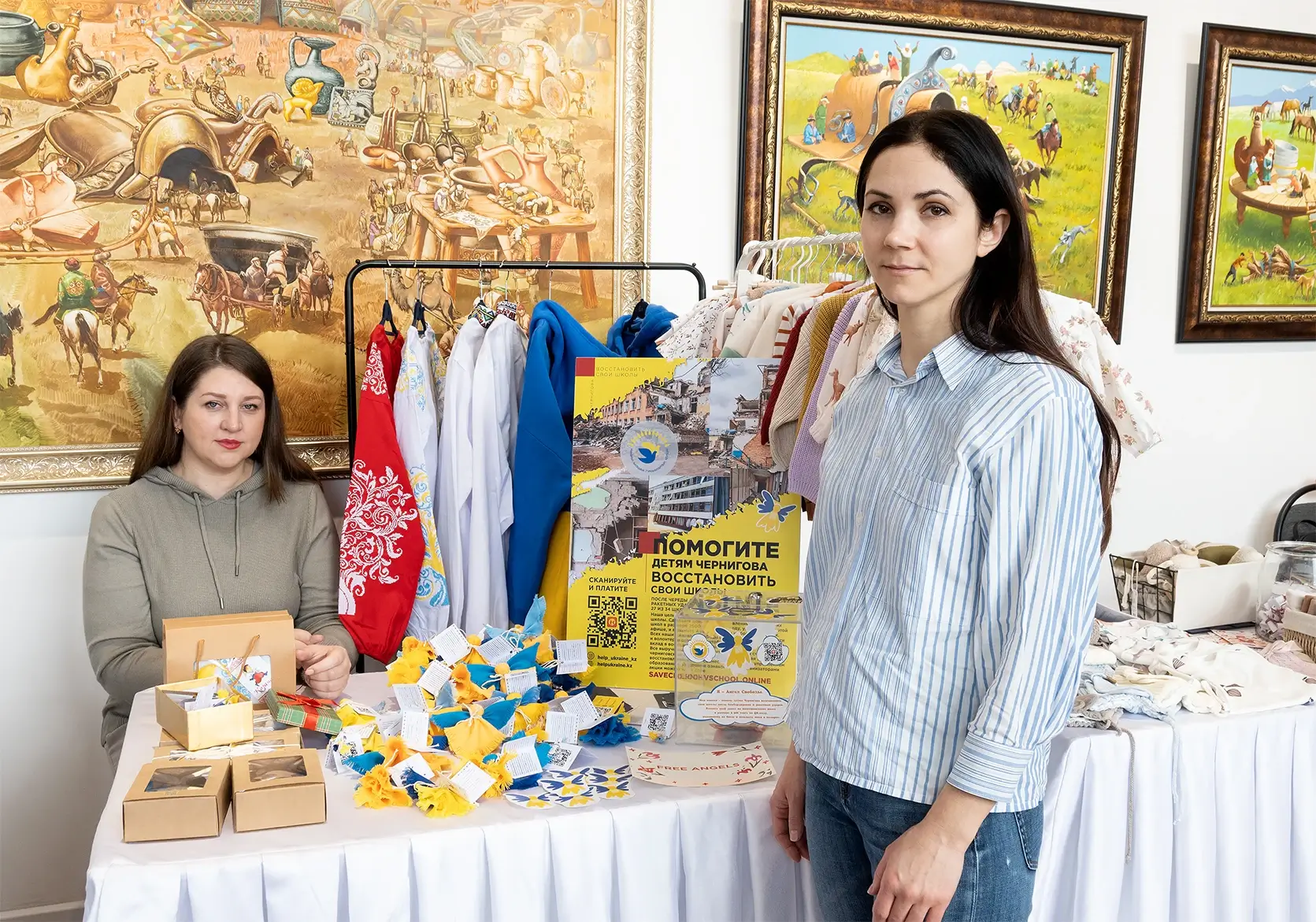
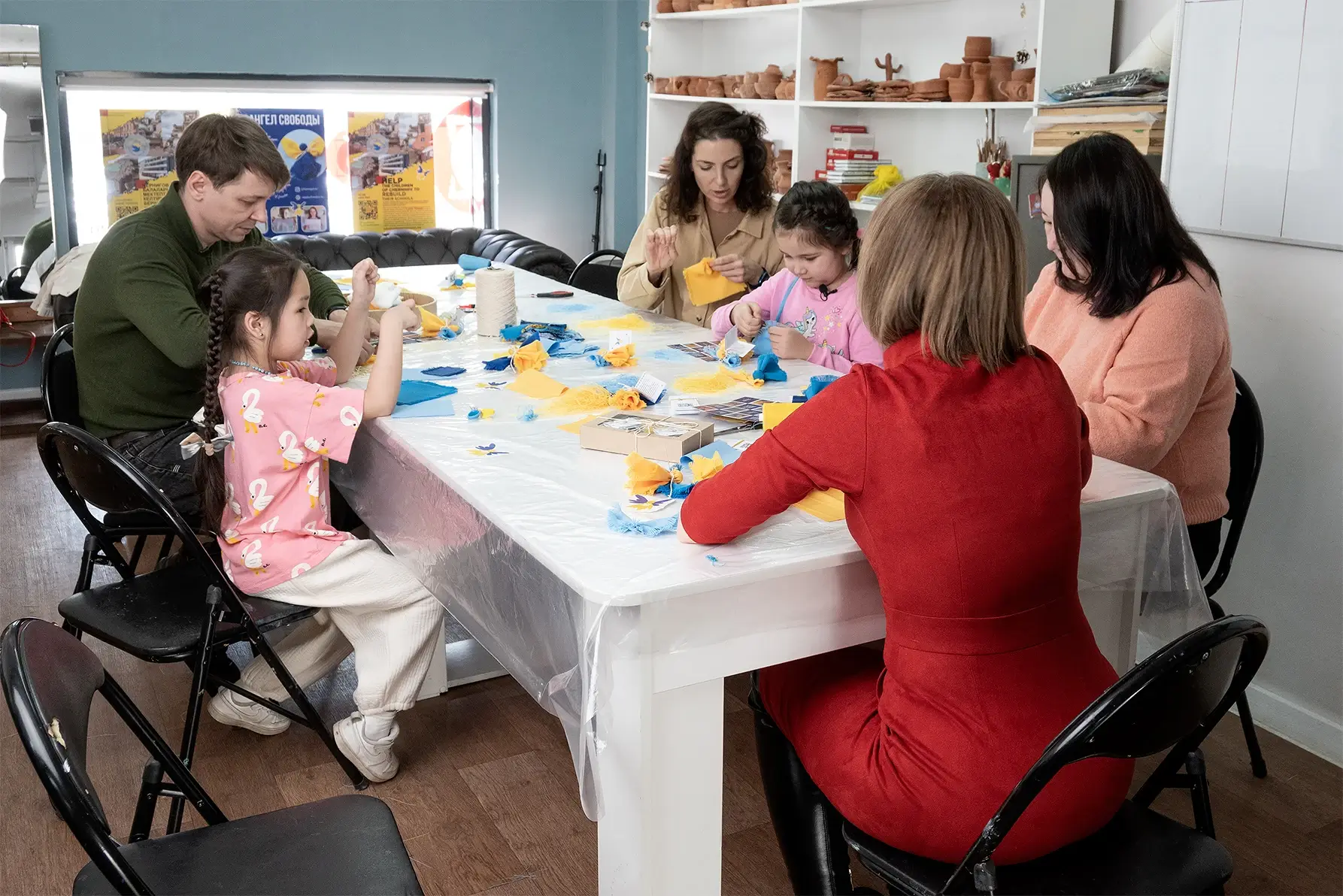
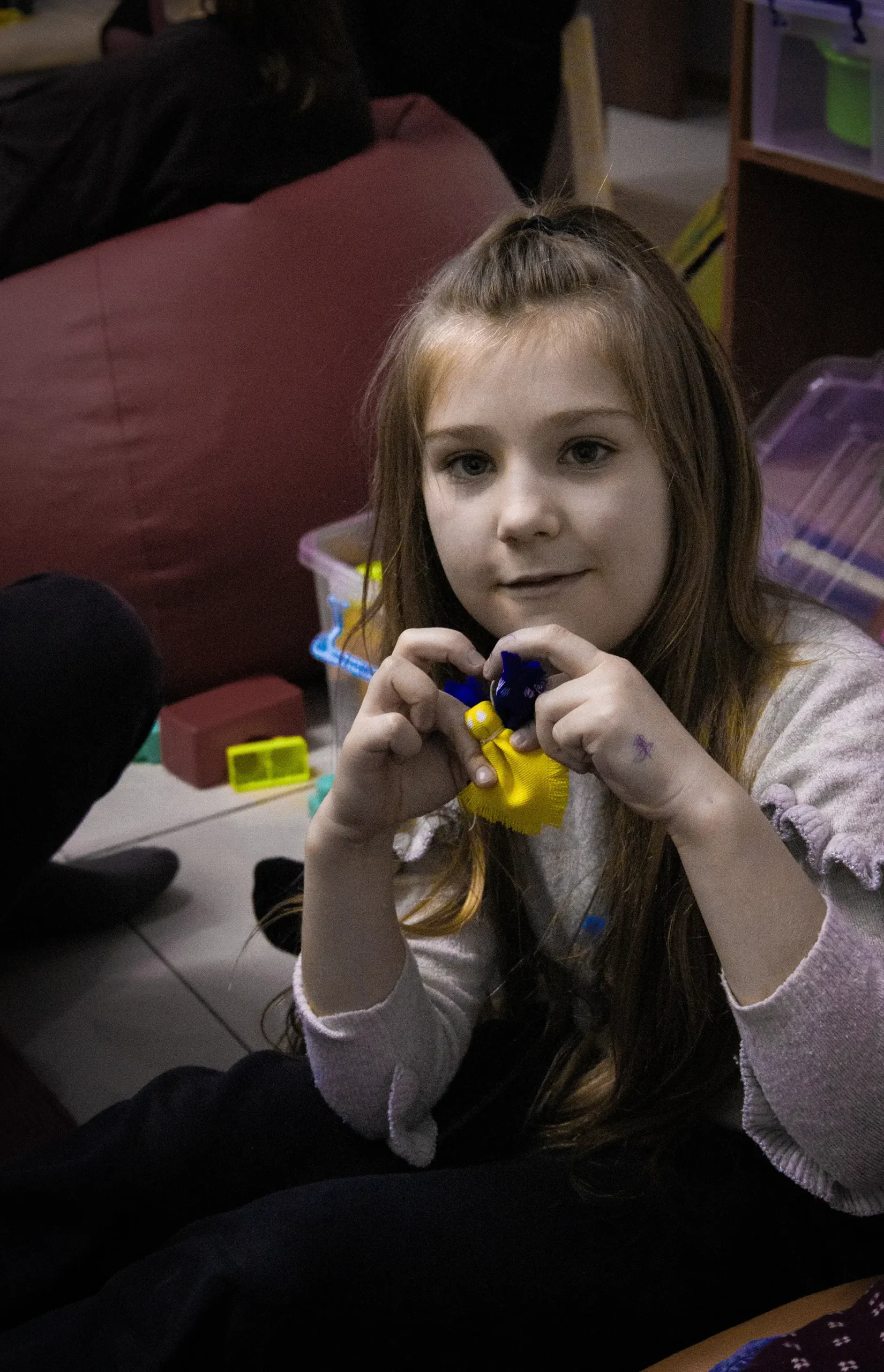
— What was your first experience of participating in the fair like?
— Usually we are paired with an experienced volunteer, but at my first fair it turned out that I was there for the first time, and my partner was participating for the first time. She, like me, is Ukrainian, who lived in Moscow for many years. We turned out to have a lot in common. Besides the foundation, we are friends with her and our families. This is perhaps the closest person here after my husband and children. There are not enough such people in emigration. And I am very grateful to the project not only for the time spent usefully, but also for this person.
— Was it difficult at the first fair? Or scary?
— No, it was neither difficult nor scary. I like socialising with people, so it was easy. Iryna and Yevgeniy [organisers — ed.] were nearby, they were holding a toloka for the children, and Sholpan [coordinator — ed.] came up to us. Therefore it was completely calm.
— What events at fairs were most memorable? Or people?
— A funny thing: a guy and a teenage girl came up, the girl donated, but she did not take an “angel”. And then the guy said to her, “I wouldn’t want to be around if your mom finds out where you donated.” We all had a great laugh then…
Once at one of the fairs a man and his wife came up and said that after the beginning of the war they had been in the hospital in Brovary for a month or a month and a half. He was positive, all covered in Ukrainian symbols — bracelets, some badges. And he just radiated life. His face stands before my eyes. He came up so happy and said, “Guys, you are doing a good deed!”
There was also a case when a man asked if it was possible to record a video from the fair. And he started filming a video with the words “For his friends who are in Russia.” He told them, “While you are destroying, we are helping to restore.” Something like that.
You show by your personal example that you do not have to stay on the sidelines somewhere, but help as much as you can, even if you do not have the financial ability. It is not just about finances, you can also help with your time.
— Iuliia, how do you explain to your children what you are doing in the project?
— My children also go to tolokas with me from time to time. The eldest also tries to participate as best she can. She literally cried today because there is toloka today… How am I explaining it? I am explaining that there is a war going on. As it is, I’m not hiding anything. I say that there are children who live in Ukraine, and they need somewhere to go during air raids and that we need to help rebuild schools, equipping bomb shelters. I had to somehow explain to a 7-year-old child why we left the country. And I had to explain why his mother was crying on the 24th, and then on the 25th, and then on the 26th.
— What changed in you during your participation in the project? What does this participation give you?
— Besides the fact that I help Ukraine, the project also helps me. Helps you cope with your pain… with your experiences, the difficulties of emigration. This is communication with people — with Kazakhs, and with Ukrainians, and with Russians.
— Nowadays there is a lot of talk about war tiredness. Do you feel this tiredness?
— Tiredness occurs from time to time. In any case, it is inevitable. But I tell myself that I am not on the territory of Ukraine, and it is much more difficult for people there than for me. What also helps me is the belief that the war will end and Ukraine will definitely win.
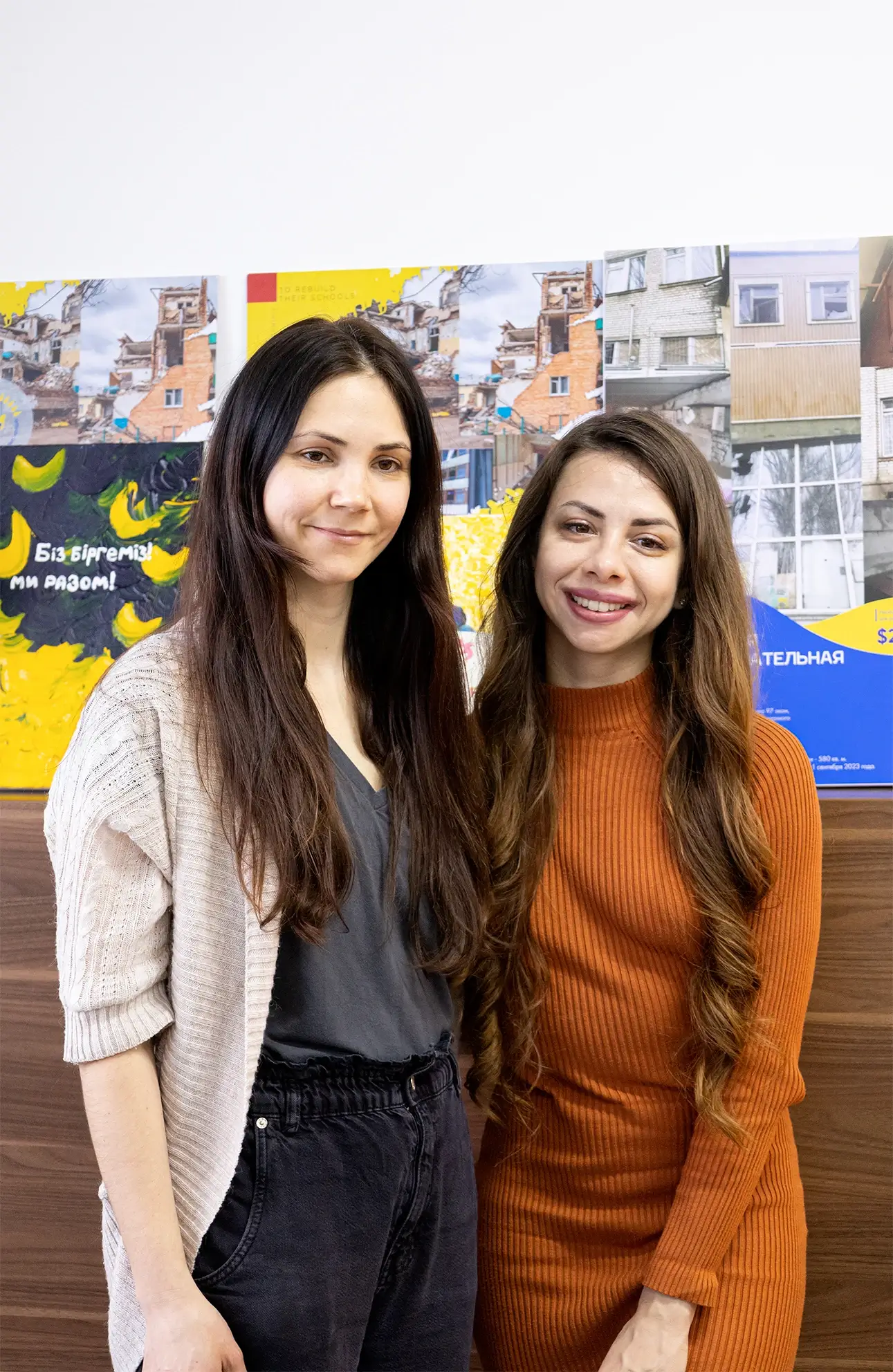
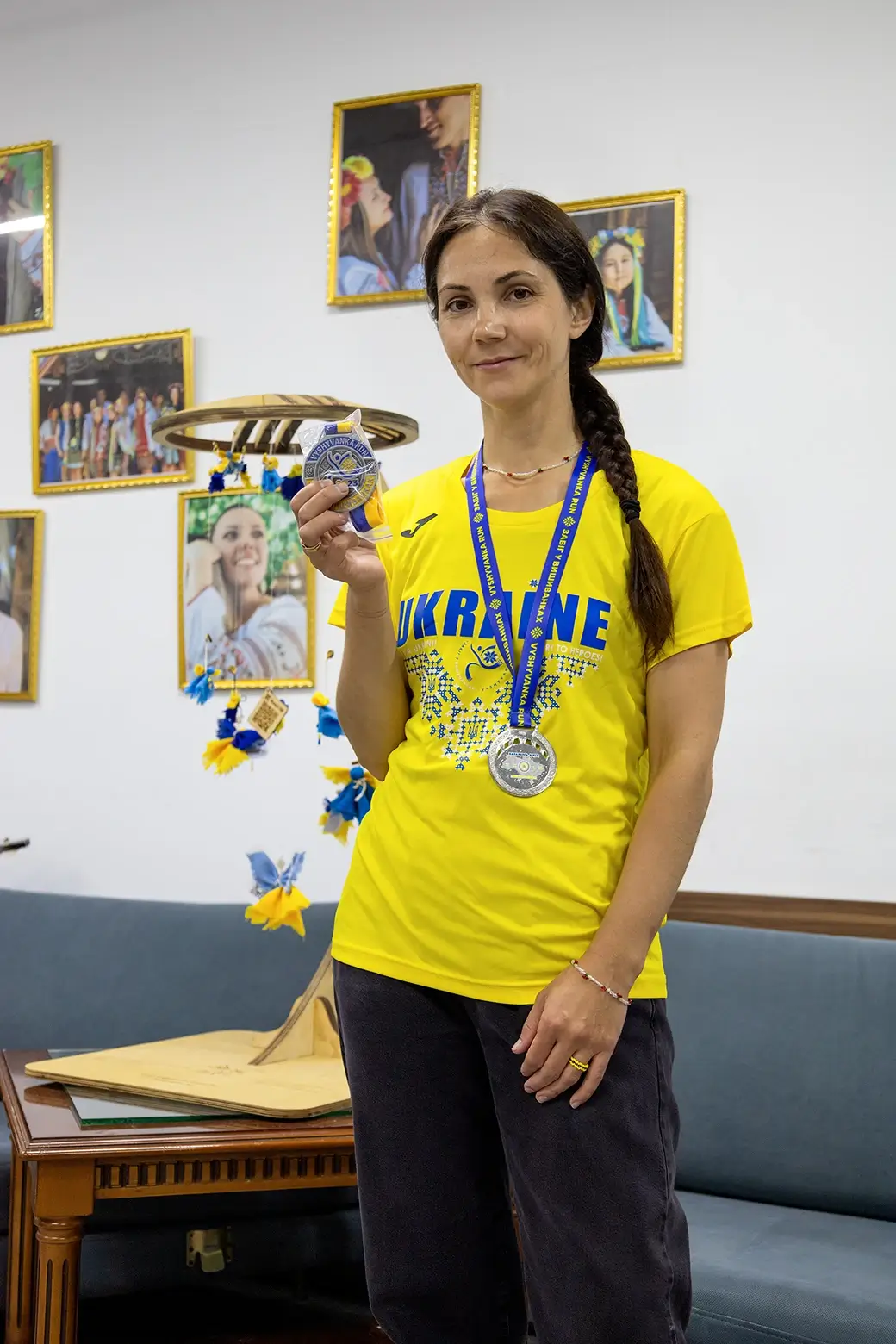
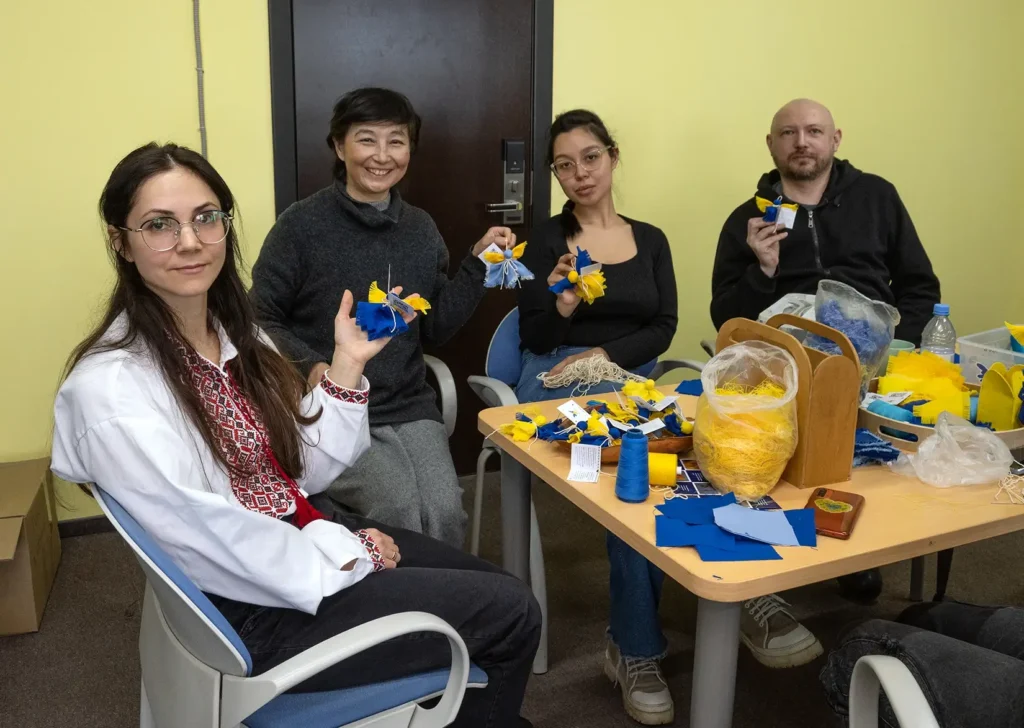
— Why is it especially important to continue helping now to the best of your ability and not stop?
— You can always give up. But if you give up, you lose. But we are talking about the lives of children. If you stop helping, then it may happen… I don’t know how to even say it… it will no longer be possible to catch up. We essentially save lives by helping to equip bomb shelters. Imagine if we don’t help, although we could help. We will not help because we have given up — and this will be a fatal moment, because children may die. Naturally, we may not even know about it. But nonetheless. You can give up and do nothing. But you can take a break, breathe out and move on.
— Iuliia, how would you continue the phrase “ ‘Angels of Freedom’ – is …?”
— Saving a life.
